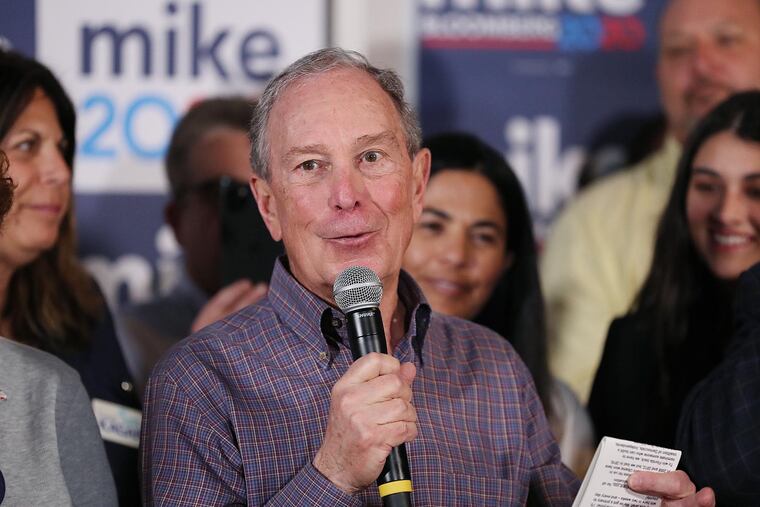Mike Bloomberg’s money changed Pennsylvania’s political economy. What now?
Former New York Mayor Mike Bloomberg promised to keep spending from his fortune, even if he lost or quit the Democratic race for president. Now that he is no longer a candidate, will he keep paying for consultants in Pennsylvania?

Now that Mike Bloomberg’s half-billion-dollar bet has gone bust, two questions remain to be answered in Pennsylvania’s political economy:
Will the billionaire former New York mayor live up to his vow to keep the money flowing to assist the eventual Democratic nominee and target President Donald Trump?
And will Bloomberg’s outsize spending be sustainable for future political gigs?
Mustafa Rashed, one of the legion of Pennsylvania consultants drafted by Bloomberg, said “decisions are being made now” about maintaining campaign staffing in the state.
“Michael Bloomberg has said all along that he is going to support the eventual Democratic nominee, no matter who that is,” Rashed said. “As of right now, that is the plan. The team is in place.”
Bloomberg dropped out of the presidential race Wednesday and endorsed former Vice President Joe Biden.
Only Sen. Bernie Sanders, who campaigns as much against “the billionaire class” as he does against Trump, has said he would reject Bloomberg’s money if he becomes the Democratic nominee.
Aubrey Montgomery, a Philadelphia fund-raising consultant who worked for Sen. Amy Klobuchar’s campaign, said she was thrilled to have friends gainfully employed, however briefly, for Bloomberg’s campaign. But she doesn’t expect his pay scale — 20% to 30% or more above the going rate — to be repeated in 2021.
“I’m happy to see political organizers being compensated like professionals,” she said. “I think that’s good for the industry. I’m sure there will be a resetting of salary expectations when this race is over. We won’t be able to pay people the Mike Bloomberg rate for municipal races next year.”
There had been speculation that Bloomberg was trying to corner the market for consultants ahead of Pennsylvania’s April 28 primary, which could have left any remaining competitors in a scramble.
“They have ruined the market in many ways, in the sense that they’re paying so much money that advocacy groups can’t find anyone,” one local consultant, who spoke on condition of anonymity to preserve business relationships, told Clout just before Bloomberg dropped out. “It’s just killing [other] campaigns because they’re soaking up all the talent.”
A former statewide political operative now working as a lobbyist, who also asked to remain anonymous, suggested Bloomberg’s enhanced pay included a “reputation premium” for consultants worried about working for a former Republican who pushed for stop-and-frisk policing and other ideas deeply unpopular with the Democratic base.
“It’s tough in a city like Philadelphia, trending left for a while, to enthusiastically support a former Republican who fought for policies that have been devastating to communities in major cities,” the lobbyist said. “They recognized it is a tough sell, and you have to do business after that.”
Clout caption contest — Mike & Mike
With Bloomberg’s exit, former Philadelphia Mayor Michael Nutter’s time as national campaign cochairperson has come to a conclusion. That got us thinking about this photo from Clout colleague Julia Terruso, of Nutter pondering the visage of his candidate while out on the trail this week in San Francisco.
Give it a gander and then shoot your best captions to clout@inquirer.com. We’ll peruse the entries and publish any that strike our fancy.
For inspiration, you can see Nutter introduce Bloomberg as “a great leader, a great man, a great person” when Bloomberg delivered a speech Wednesday about the end of his campaign. And yes, Nutter dropped the mic on stage. It’s a thing he does. Don’t ask us to explain it.
Pa. Democratic Jewish PAC avoids primary endorsements, until now
As far as political action committees go, Democratic Jewish Outreach Pennsylvania isn’t going to shatter any fund-raising records. The group, based in the Philadelphia suburbs, raised about $17,000 last year.
And while it may not hold as much sway as Jim Clyburn does in South Carolina, the group says the presidential race is so important that it’s breaking its own rule prohibiting endorsements in a primary.
“We think in order to defeat Trump, we need to solidify and unify,” said Jill Zipin, the PAC’s chairwoman. “We consider ourselves liberal. We consider ourselves progressive. But we don’t consider ourselves revolutionary. We believe that Vice President Biden best reflects Jewish values.”
She said the PAC wanted its donors, 9,800 Facebook followers, and email list of 1,500 people to “know of our support.”
Zipin and others founded an earlier iteration of the group in 2008 to counter a Republican Jewish group’s attack ads against Barack Obama. It later became a political action committee.
Powered by mostly small-dollar contributions, the group places ads in Jewish media and in newspapers like The Inquirer, the Morning Call in Allentown, and the Centre Daily Times in State College. Its events draw members of Congress and prominent Democrats like former Gov. Ed Rendell.
“We take the small-dollar donations and leverage them in a very big way,” Zipin said.
Kind of like Bernie Sanders.
Staff writer Andrew Seidman contributed to this article.